Salukis Dog
- January 31, 2024
- 0 comment
Salukis, often referred to as the “Royal Hounds of Egypt,” are a captivating and majestic breed of dogs with a rich history and unique characteristics. Originating from the Fertile Crescent, they have been cherished by various civilizations throughout the ages. In ancient Egypt, Salukis were not only prized for their hunting prowess but also revered for their loyalty, often depicted in hieroglyphs and even mummified to accompany their owners into the afterlife.
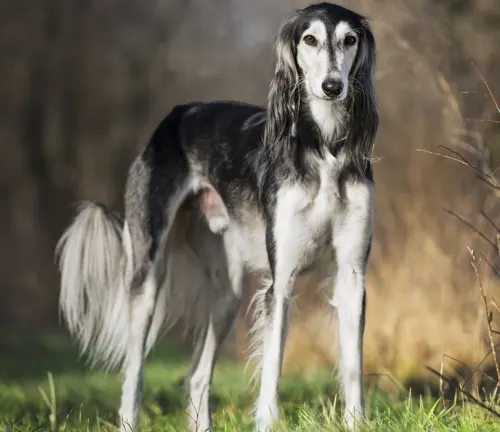
This breed’s striking appearance, characterized by a slender build, deep chest, and long legs, gives them an almost regal aura. Their silky, feathered tails and elegant necks further enhance their beauty. Despite their majestic appearance, Salukis are known for their gentle and affectionate nature, making them wonderful companions. Whether you’re fascinated by their rich history, unique characteristics, or their cultural significance in various parts of the world, Salukis are undeniably a breed worth exploring and considering as a cherished pet.
| Specification | Description |
|---|---|
| Size | Medium to large |
| Weight | 35 to 70 pounds (16 to 32 kg) |
| Height | 23 to 28 inches (58 to 71 cm) at the shoulder |
| Coat | Short and smooth with feathering on ears and tail |
| Colors | Various colors including cream, red, black and tan |
| Lifespan | 12 to 14 years |
| Temperament | Gentle, loyal, reserved, and affectionate |
| Intelligence | Moderate to high |
| Exercise Needs | High; requires daily exercise to stay healthy |
| Grooming | Minimal shedding; regular brushing and ear cleaning |
| Trainability | Independent thinker; needs consistent and patient training |
| Health Issues | Prone to heart issues, hip dysplasia, and bloat |
| Purpose | Historically used for hunting, now cherished as a companion |
| Special Features | Graceful appearance with long legs and deep chest |
| Popularity | Recognized by major kennel clubs worldwide |
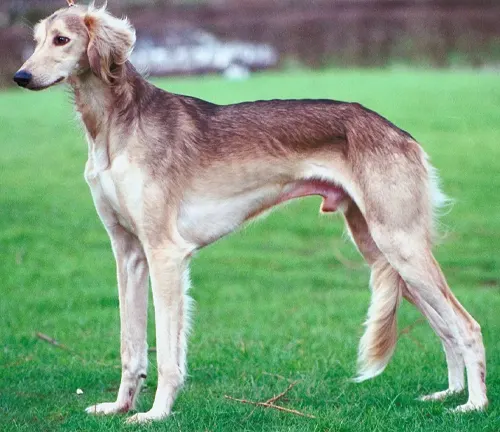
Salukis, often referred to as the “Royal Hounds of Egypt,” are a captivating breed of dogs that have graced the Earth with their elegance and charm for centuries. In this article, we will delve deep into the world of Salukis, exploring their history, characteristics, care, and much more. Join us on this enchanting journey to discover the remarkable qualities of these majestic canines.
A Brief History of Salukis
Salukis have a history that is as rich as it is ancient. Believed to have originated in the Fertile Crescent, they have been cherished by various civilizations throughout the ages.

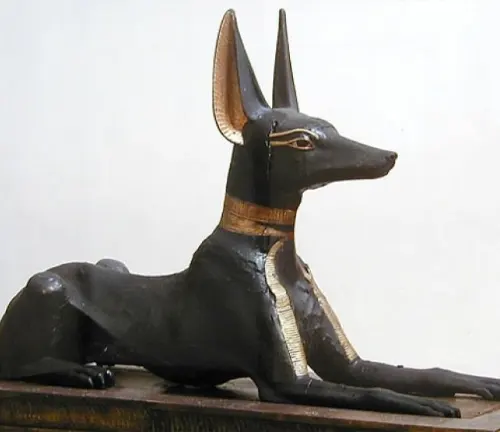
Ancient Egyptian Companions
In ancient Egypt, Salukis were revered not only for their hunting prowess but also for their loyalty. They were often depicted in hieroglyphs and were even mummified to accompany their owners into the afterlife.
Arab Nobility’s Favorites
The Arab world has long had a special affinity for Salukis. They were considered a symbol of nobility and grace, often used for hunting gazelles across the vast deserts.
Saluki’s Unique Characteristics
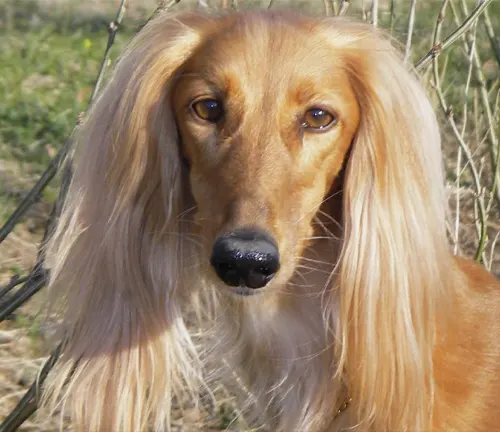
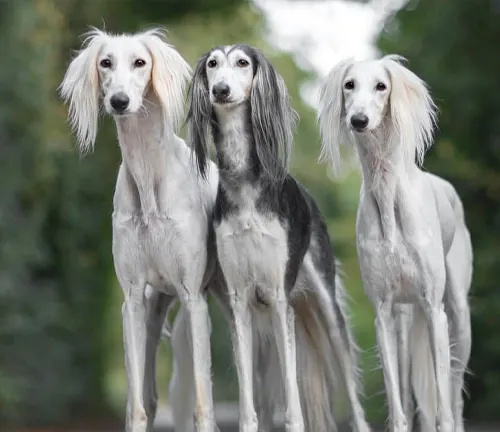
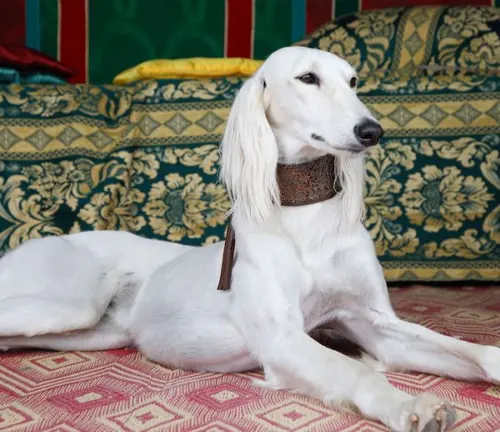
- Graceful Appearance: Salukis are known for their elegant and graceful appearance. They have a slender build, deep chest, and long legs, giving them a regal and statuesque look. Their silky, feathered tails and graceful necks add to their overall charm.
- Effortless Speed: These dogs are incredibly fast runners. They have been referred to as the “cheetahs of the dog world” due to their ability to reach remarkable speeds in pursuit of prey.
- Gentle Temperament: Despite their majestic appearance and hunting history, Salukis have gentle and affectionate temperaments. They are typically reserved but form strong bonds with their human companions. They are known for their loyalty and make excellent family pets.
- Low Shedding: Salukis have short, smooth coats that shed minimally. This makes them a great choice for individuals with allergies or those who prefer to have a clean home.
- Independence: Salukis are independent thinkers. While they can be trained, they often have a mind of their own and may require patient and consistent training methods.
- Quiet Demeanor: Salukis are not known to be excessive barkers. They tend to be quiet and dignified, making them well-suited for households where excessive noise may be a concern.
- Sighthound Instincts: Salukis are sighthounds, which means they have a strong instinct to chase after moving objects. This can include anything from small animals to fast-moving vehicles, so they need to be kept in secure areas or on a leash during walks.
- High Stamina: Salukis have impressive endurance and stamina. They can go on long runs or hikes and keep up with active owners.
- Minimal Odor: Salukis have a relatively low odor compared to some other dog breeds. This characteristic can make them more pleasant to have indoors.
- Affectionate with Children: Salukis are generally good with children, and their gentle nature makes them suitable companions for families.
Caring for Your Saluki’s
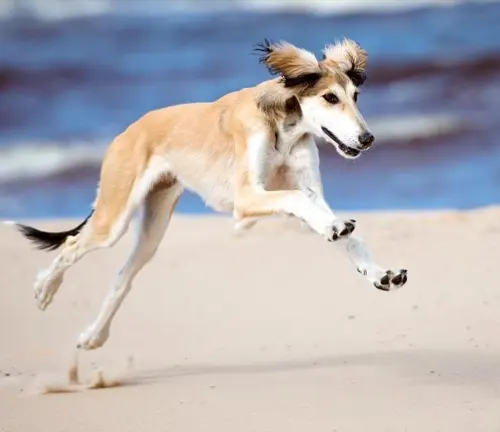

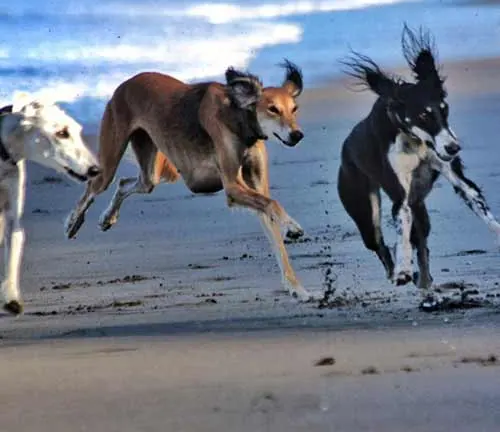
- Regular Exercise: Salukis are an active breed and require daily exercise to keep them physically and mentally stimulated. Plan for brisk walks, runs, or playtime in a secure, fenced area. Engage them in activities that allow them to stretch their legs and run, as they have a natural instinct to chase.
- Grooming: Salukis have short, smooth coats that are relatively easy to maintain. However, regular brushing is necessary to keep their fur in good condition and to minimize shedding. Additionally, you should clean their ears regularly and brush their teeth to maintain oral hygiene.
- Nutrition: Provide your Saluki with a balanced and high-quality diet appropriate for their age, size, and activity level. Consult with your veterinarian to determine the best feeding plan for your specific dog. Ensure access to fresh water at all times.
- Regular Vet Check-ups: Schedule regular check-ups with your veterinarian to monitor your Saluki’s overall health. Keep up with vaccinations, parasite control, and dental care as recommended by your vet.
- Training and Socialization: Start training and socialization early to ensure your Saluki becomes a well-behaved and well-adjusted pet. Socialize them with various people, animals, and environments to prevent shyness or fearfulness.
- Secure Enclosures: Due to their sighthound instincts and desire to chase moving objects, it’s crucial to have a securely fenced yard or use a leash when taking your Saluki for walks. Ensure that fences are high enough and that gates are properly closed to prevent escape.
- Mental Stimulation: Salukis are intelligent dogs and benefit from mental stimulation. Provide puzzle toys, engage in training sessions, and offer activities that challenge their minds to prevent boredom.
- Comfort and Shelter: Salukis are sensitive to extreme temperatures. Ensure they have a comfortable and warm place to sleep indoors, especially during colder months. Protect them from heat during hot weather, as they can be prone to heatstroke.
- Health Monitoring: Keep an eye out for any signs of illness or discomfort, such as changes in appetite, behavior, or activity levels. Early detection and treatment of health issues can be crucial for your Saluki’s well-being.
- Love and Attention: Salukis thrive on human companionship and affection. Spend quality time with your dog, offer plenty of love and attention, and build a strong bond through positive interactions.
Salukis in Popular Culture
Salukis have made their mark in various forms of popular culture over the years. Their unique and elegant appearance, as well as their rich history, have captured the imaginations of people worldwide. Here are some ways Salukis have been featured in popular culture:
Literary Inspirations
Salukis have been a source of inspiration for numerous authors and poets. Their grace and beauty often find mention in literature, adding a touch of elegance to many works. For example, you can find references to Salukis in poems, novels, and stories that celebrate their regal qualities.
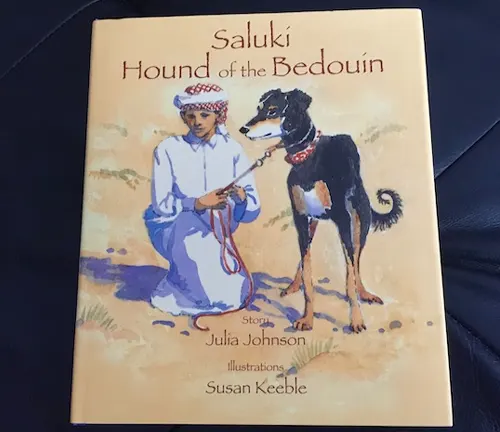
Hollywood Stars
Salukis have occasionally graced the silver screen and television. Their striking appearance and graceful movements have made them popular choices for filmmakers and producers looking to portray elegance and sophistication. You might spot a Saluki in various films and TV shows, where they often play the role of a distinguished and exotic canine companion.
Artistic Depictions
Salukis have been the subjects of paintings, sculptures, and other artistic creations for centuries. Artists have been drawn to their unique beauty and have sought to capture their essence on canvas, in stone, and in other forms of visual art.
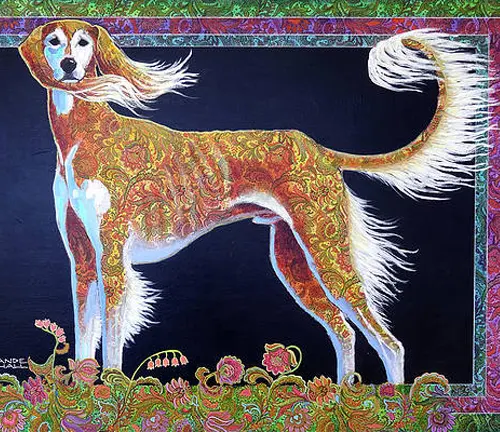
Advertising and Branding
Salukis’ aesthetic appeal has been used in advertising and branding. Their image has been incorporated into various products and advertisements to evoke a sense of refinement and sophistication.
Mascots and Symbols
Salukis have been chosen as mascots for sports teams, schools, and organizations. Their regal and distinctive appearance makes them a symbol of pride and nobility.
Dog Shows and Competitions
Salukis frequently participate in dog shows and competitions, showcasing their grace and beauty to judges and audiences. Their presence adds prestige to these events.

Cultural Significance
In regions where Salukis have historical significance, they continue to hold a special place in the culture. They may appear in traditional art, folklore, and ceremonies, further cementing their importance in the cultural fabric.
Different Species
Saluki dogs are a distinct breed, and there are no different species of Salukis. However, within the Saluki breed, there can be variations in coat color and markings. Salukis are known for their slender, graceful build, deep chest, and long legs, which are consistent characteristics across all individual Salukis.
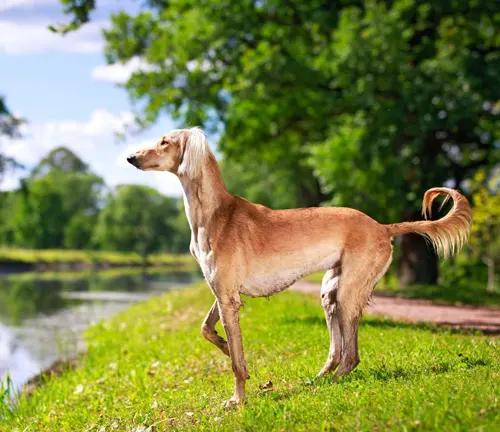
Frequently Asked Question (FAQs)
- Are Salukis good with children?
Yes, Salukis are generally good with children and make affectionate family pets. - Do Salukis require a lot of exercise?
Yes, Salukis are an active breed and need regular exercise to stay healthy and happy. - What is the lifespan of a Saluki?
Salukis typically live for 12 to 14 years with proper care. - Are Salukis easy to train?
Salukis can be independent and stubborn, so consistent and patient training is essential. - Are Salukis prone to health issues?
Salukis can be prone to certain health issues, including heart problems, hip dysplasia, and bloat. - Do Salukis shed a lot?
Salukis have minimal shedding due to their short, smooth coat. - Are Salukis good with other pets?
Salukis can coexist with other pets if properly socialized, but they may have a strong prey drive, particularly towards smaller animals. - What is the origin of the Saluki breed?
Salukis are believed to have originated in the Fertile Crescent and have a history dating back thousands of years. - Do Salukis require a fenced yard?
Due to their sighthound instincts, Salukis should be in a securely fenced area or on a leash during walks to prevent them from chasing after moving objects. - Are Salukis good for first-time dog owners?
Salukis can be more challenging for first-time owners due to their independent nature and specific care requirements. - Do Salukis bark a lot?
Salukis are generally not excessive barkers and tend to be quiet and dignified. - Are Salukis suitable for apartment living?
Salukis can adapt to apartment living if they receive enough exercise and mental stimulation, but they thrive in homes with access to a secure yard. - What is the recommended diet for Salukis?
Consult with a veterinarian for a balanced and high-quality diet tailored to your Saluki’s specific needs. - Do Salukis have a strong prey drive?
Yes, Salukis have a strong prey drive due to their history as hunting dogs, so they may be inclined to chase after small animals. - Are Salukis good for long-distance running or hiking?
Salukis have high stamina and can be excellent companions for long-distance running or hiking with proper conditioning.


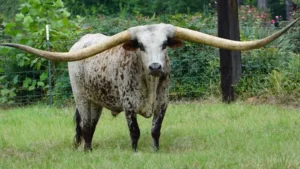
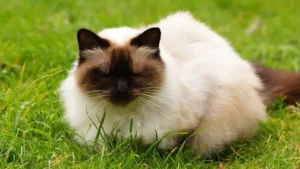
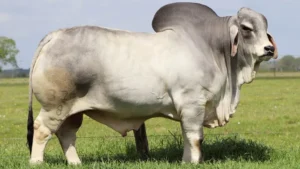


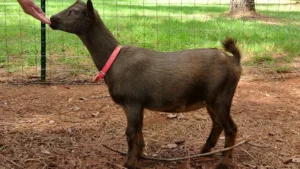


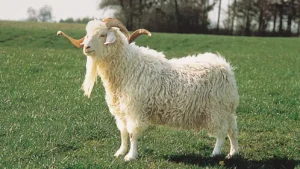



Leave your comment